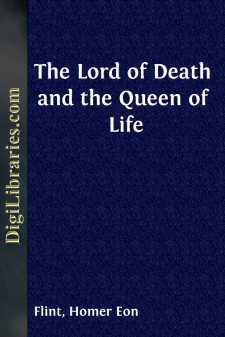Categories
- Antiques & Collectibles 13
- Architecture 36
- Art 48
- Bibles 22
- Biography & Autobiography 813
- Body, Mind & Spirit 142
- Business & Economics 28
- Children's Books 15
- Children's Fiction 12
- Computers 4
- Cooking 94
- Crafts & Hobbies 4
- Drama 346
- Education 46
- Family & Relationships 57
- Fiction 11829
- Games 19
- Gardening 17
- Health & Fitness 34
- History 1377
- House & Home 1
- Humor 147
- Juvenile Fiction 1873
- Juvenile Nonfiction 202
- Language Arts & Disciplines 88
- Law 16
- Literary Collections 686
- Literary Criticism 179
- Mathematics 13
- Medical 41
- Music 40
- Nature 179
- Non-Classifiable 1768
- Performing Arts 7
- Periodicals 1453
- Philosophy 64
- Photography 2
- Poetry 896
- Political Science 203
- Psychology 42
- Reference 154
- Religion 513
- Science 126
- Self-Help 84
- Social Science 81
- Sports & Recreation 34
- Study Aids 3
- Technology & Engineering 59
- Transportation 23
- Travel 463
- True Crime 29
The Lord of Death and the Queen of Life
by: Homer Eon Flint
Description:
Excerpt
THE SKY CUBE
The doctor, who was easily the most musical of the four men, sang in a cheerful baritone:
"The owl and the pussy-cat went to sea In a beautiful, pea-green boat."
The geologist, who had held down the lower end of a quartet in his university days, growled an accompaniment under his breath as he blithely peeled the potatoes. Occasionally a high-pitched note or two came from the direction of the engineer; he could not spare much wind while clambering about the machinery, oil-can in hand. The architect, alone, ignored the famous tune.
"What I can't understand, Smith," he insisted, "is how you draw the electricity from the ether into this car without blasting us all to cinders."
The engineer squinted through an opal glass shutter into one of the tunnels, through which the anti-gravitation current was pouring. "If you didn't know any more about buildings than you do about machinery, Jackson," he grunted, because of his squatting position, "I'd hate to live in one of your houses!"
The architect smiled grimly. "You're living in one of 'em right now,
Smith," said he; "that is, if you call this car a house."
Smith straightened up. He was an unimportant-looking man, of medium height and build, and bearing a mild, good-humored expression. Nobody would ever look at him twice, would ever guess that his skull concealed an unusually complete knowledge of electricity, mechanisms, and such practical matters.
"I told you yesterday, Jackson," he said, "that the air surrounding the earth is chock full of electricity. And—"
"And that the higher we go, the more juice," added the other, remembering. "As much as to say that it is the atmosphere, then, that protects the earth from the surrounding voltage."
The engineer nodded. "Occasionally it breaks through, anyhow, in the form of lightning. Now, in order to control that current, and prevent it from turning this machine, and us, into ashes, all we do is to pass the juice through a cylinder of highly compressed air, fixed in this wall. By varying the pressure and dampness within the cylinder, we can regulate the flow."
The builder nodded rapidly. "All right. But why doesn't the electricity affect the walls themselves? I thought they were made of steel."
The engineer glanced through the dead-light at the reddish disk of the Earth, hazy and indistinct at a distance of forty million miles. "It isn't steel; it's a non-magnetic alloy. Besides, there's a layer of crystalline sulphur between the alloy and the vacuum space."
"The vacuum is what keeps out the cold, isn't it?" Jackson knew, but he asked in order to learn more.
"Keeps out the sun's heat, too. The outer shell is pretty blamed hot on that side, just as hot as it is cold on the shady side." Smith seated himself beside a huge electrical machine, a rotary converter which he next indicated with a jerk of his thumb. "But you don't want to forget that the juice outside is no use to us, the way it is. We have to change it.
"It's neither positive nor negative; it's just neutral....





